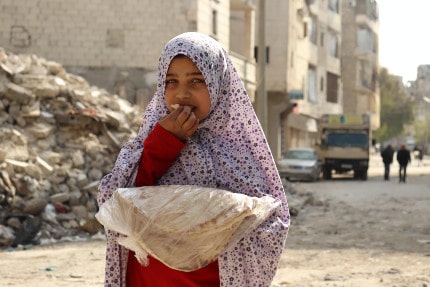Joint UN programme to bolster critical services for 45,000 people
Damascus, Syria 26 July 2022 — Through a €2.5 million grant to the United Nations in Syria, the Government of Italy commits to enhancing access to water and sanitation services and livelihoods to support vulnerable communities in Homs, Syria.
“The Government of Italy is committed to support area-based interventions, working together with UN Agencies; funding joint programmes focused on early recovery, livelihoods with a special attention on gender,” said Massimiliano D’Antuono, Chargé d’Affaires of the Italian Embassy in Damascus.
“I’m glad of the possibility to work jointly with UN Agencies to meet the most challenging needs of the people in Syria. UN’s joint interventions in a specific area, building on one other’s expertise, allows us to have a holistic approach for a better impact on the targeted people,” added Alessandra Piermattei, Director of the Italian Agency for Development Cooperation for Lebanon and Syria.
In Syria, nearly two thirds of water treatment plants, half pumping stations and one third of water towers have been damaged because of the conflict. Nearly half of the people rely on alternative and often unsafe water sources to meet or complement their water needs and at least 70 per cent of the discharged sewage is untreated.
The lack of access to safe water has also a disproportionate impact on women and girls. Around 70 per cent of the people working in farming are women and approximately 25 per cent are female-headed households.
“Lack of access to clean water will have significant impacts on women’s and girls’ health, including their reproductive health since women have specific hygiene needs during menstruation, pregnancy and breastfeeding. It could also lead to an increase in poverty, maternal mortality and morbidity,” said Dr Himyar Abdulmoghni, UNFPA Syria Representative a.i.
Poor water quality also tends to result into more waterborne diseases, including diarrhoea, particularly among children. Children often fetch water and time spent on it means they spend less time in school.
“Safe water is a right, not a privilege. With the funding from the Government of Italy, UNICEF, as part of the UN family, will provide 45,000 people in vulnerable communities with access to clean water and good sanitation to meet their basic needs and give them an opportunity to start rebuilding their lives,” said Bo Viktor Nylund, UNICEF Syria Representative.
Through the partnership with Italy, United Nations Children’s Fund (UNICEF) jointly with United Nations Development Programme (UNDP) and United Nations Population Fund (UNFPA), will work to support children and their families in accessing water safely and sustainably, strengthening livelihoods of farmers with adequate irrigation water, facilitating dialogue to decrease risks of abuse and sexual violence while collecting water, and increasing awareness on good menstrual health and access to hygiene products.
“With unemployment and underemployment at record levels, significant socio-economic deterioration, and competition over resources, it is more crucial than ever to invest in early recovery and livelihoods interventions with a focus on local community resilience through rehabilitation of humanitarian infrastructure, livelihoods support and social cohesion activities,” said Ramla Khalidi, UNDP Resident Representative in Syria.
The priority interventions of the joint programme include:
- Systematic repair of the primary and secondary water distribution network, water storage facilities
- Rehabilitation of water production and water treatment infrastructure such as water intakes, pumping stations and water treatment plants — all aiming to restore the basic service delivery
- Rehabilitation of the existing sewage network, with preference given to implementing water and sanitation projects jointly in a single area
- Use of solar power to provide access to water and enhance climate resilience
- Rehabilitation of wells and irrigation networks based on a comprehensive assessment
- Facilitation of engagement by farmers and community members to ensure sustainable, inclusive and context sensitive water management using participatory approaches
- Promotion of efficient usage of irrigation through regenerative agriculture to enhance sustainable crop production and mitigate the effects of drought
- Promotion of green jobs and diversifying income generation activities, such as value-added processing of agricultural products, and supporting entrepreneurs and MSMEs with a special emphasis on women entrepreneurs and cooperatives.
- Meaningful and systematic engagement with women and men of various ages in decisions related to water and sanitation, irrigation, and reproductive health and rights
- Improvement of women’s and girls’ safety and menstrual hygiene management and strengthened access to reproductive health and Gender Based Violence services
Per saperne di più cliccare qui.

